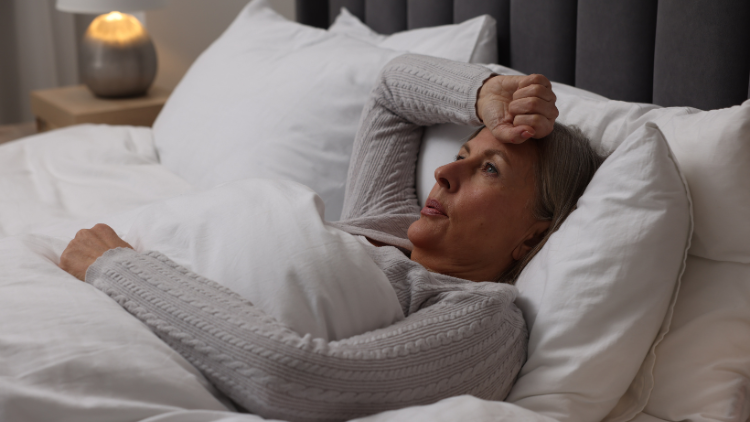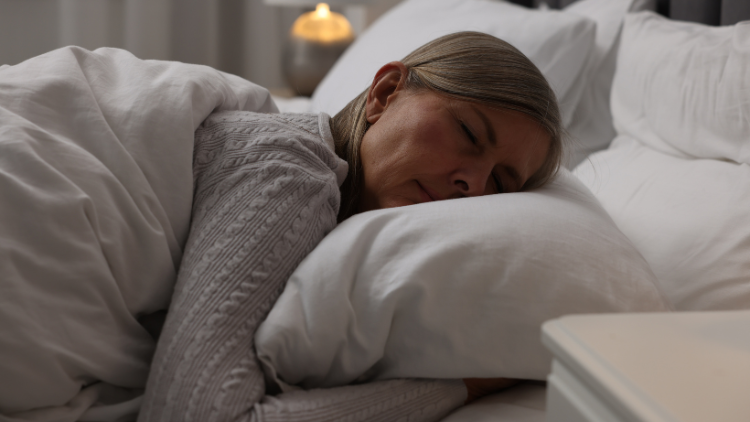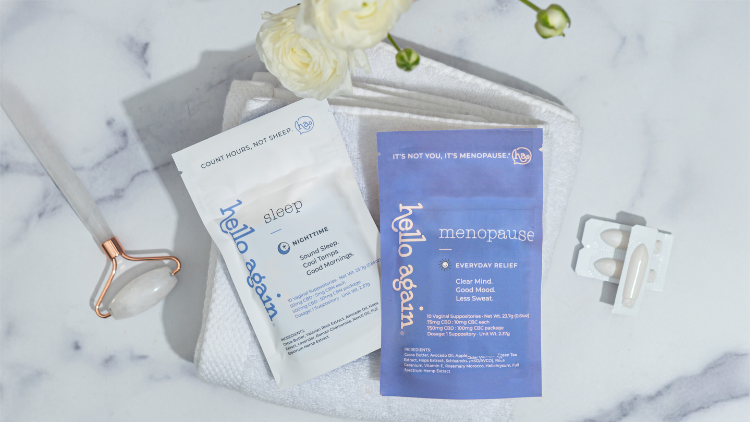Menopause and Sleep: Why You’re Wide Awake at 3 AM

It’s 2 AM and your sheets are soaked—for the third time this week. You kick the covers off, check the clock, and wonder if you’ll ever sleep through the night again. If that sounds familiar, welcome to one of the most frustrating (and least talked about) parts of perimenopause and menopause: sleep problems.
Between hormonal sleep disruption, night sweats, and the sudden urge to overanalyze every life decision at 3 AM, getting quality rest during this phase can feel like a joke. But here’s the thing—it’s not just in your head. And it’s definitely not just you. Menopause and sleep don’t always play nicely together, but that doesn’t mean you’re doomed to restless nights forever.
In this blog, we’re breaking down what’s really going on behind those sleepless nights—why your hormones are making it harder to drift off, how sleep (or lack thereof) impacts everything else, and what you can do about it. From understanding your sleep cycle to natural remedies that support real rest—no sheep required.

Symptoms of Menopause That Affect Sleep
Menopause insomnia is real. In fact, women going through perimenopause or postmenopause are nearly twice as likely to report sleep issues compared to those who aren’t in this phase. So if your nights feel off, your hormones are likely behind it—and you’re in good (exhausted) company.
Here’s what’s happening: as estrogen and progesterone levels start to decline, your body’s sleep regulation takes a hit. Estrogen helps keep your body temperature stable and supports serotonin production (hello, mood and sleep cycles), while progesterone has a calming, sleep-promoting effect. So when both start dipping? Cue the chaos and the menopause symptoms.
Hot Flashes and Night Sweats
Let’s start with the classic culprits: hot flashes and night sweats. These all-too-common menopause symptoms mess with your internal thermostat, causing sudden spikes in body temperature that jolt you awake, sometimes multiple times a night. Roughly 75% of women experience these fiery interruptions, turning what should be restorative sleep into a sweaty, stop-and-start struggle.
Mood Swings and Mental Restlessness
Fluctuating hormones can also throw your mood into a tailspin, and that emotional rollercoaster doesn’t clock out at bedtime. Sudden anxiety spikes, irritability, or just feeling emotionally “off” can leave your mind racing when you’re trying to wind down, or make it nearly impossible to fall back asleep. It’s not just frustrating—it’s exhausting, and it adds another layer to the already complex puzzle of menopause and sleep.
Disrupted Sleep = Disrupted Life
Sleep disruption in menopause doesn’t stop when the sun comes up. Poor rest can lead to low energy, memory issues, brain fog, and mental health challenges. When your body doesn’t get the deep, restorative sleep it needs, everything from productivity to patience takes a hit.
So what’s really going on behind the scenes?
If you’re starting to wonder whether your body just forgot how to sleep, you’re not imagining things. The truth lies in your sleep cycle, a carefully orchestrated process that’s easily thrown off by shifting hormones. Let’s break it down.
The Science of Sleep: Understanding Your Sleep Cycle
To understand why sleep feels so off, it helps to know what’s actually supposed to happen. Sleep isn’t just one long, uninterrupted stretch—it’s a dynamic cycle made up of four distinct stages that your body moves through several times a night. Each stage plays a distinct role in helping you feel rested, clear-headed, and ready to tackle the day. When that cycle gets disrupted, it’s no wonder you wake up feeling anything but refreshed. Let’s break it down.
The Four Stages of Sleep
Transition to Sleep
Also known as the lightest stage of non-REM sleep, this phase is your body’s way of transitioning out of wakefulness. It lasts only 1 to 5 minutes and is super easy to wake from. During this stage, your muscles begin to relax, brain activity starts to slow, and your eye movements drift. If all goes smoothly, you’ll slip into Stage 2 without even noticing—but when things like hot flashes or racing thoughts interrupt the process, it’s easy to feel like you never fell asleep at all.
Light Sleep
This is where your body starts powering down for the night—your breathing and heart rate slow, your core temperature drops, and brain waves begin to settle. It might not feel like much is happening, but this stage is a big deal: it makes up about 45–55% of your total sleep. Think of it as your body’s way of buffering against distractions and prepping for deeper rest. If this stage gets disrupted, it throws off the rest of your sleep cycle, leaving you groggy, unfocused, and not your best self in the morning.
Deep Sleep
This is the powerhouse stage, where real recovery happens. During deep sleep, your body shifts into repair mode: muscles heal, tissues regenerate, and your immune system gets a much-needed boost. It’s also key for memory consolidation and learning, helping your brain process the day. Most of your deep sleep happens in the first half of the night and can last anywhere from 20 to 40 minutes per cycle.
REM Sleep
Welcome to the dream zone. REM (Rapid Eye Movement) sleep is a stage of sleep when your brain becomes highly active, processing emotions, sorting memories, and consolidating new information. It usually kicks in about 90 minutes after you fall asleep and lasts longer with each subsequent sleep cycle, accounting for around 20–25% of your night. Your eyes move rapidly behind closed lids, breathing and heart rate increase, and vivid dreaming occurs.
What Changes During Menopause?
As estrogen and progesterone levels decline, your sleep cycle can become disrupted. You may spend less time in deep sleep and REM, and more time tossing, turning, or waking up multiple times a night. Hormonal sleep disruption affects your body’s internal clock (aka circadian rhythm), which is why waking up between 2–4 a.m. becomes such a familiar—and annoying—pattern.

Why Sleep Is a Big Deal
We all know sleep is essential, but when you’re in the thick of menopause sleep problems, it can start to feel optional. Spoiler: it’s not. Quality rest is essentially the glue that holds your mood, memory, metabolism, and sanity together. When sleep and menopause health collide, things can get messy—but understanding why sleep matters might just give you the motivation to make it a priority.
Mood Stability
Ever felt like a totally different person after a bad night’s sleep? That’s because sleep and mood are deeply connected. Lack of sleep messes with your emotional regulation, making you more irritable, anxious, or teary (hi, mood swings). A well-rested brain is a kinder, more balanced one.
Energy & Libido
Dragging yourself through the day with zero energy—and even less desire for anything remotely fun? Poor sleep tanks your energy and your libido. Both your body and your relationships deserve better.
Mental Clarity
Brain fog is real, and sleep deprivation makes it worse. Your brain needs rest to process memories, make decisions, and not forget why you walked into the room. Without consistent deep and REM sleep, even simple tasks can feel like uphill battles. Over time, this mental fatigue can impact your confidence, focus, and overall sense of clarity.
Immune Function
You can’t fight off anything—not colds, not inflammation—when you’re running on empty. Sleep gives your immune system the recharge it needs to keep you feeling strong. During quality rest, your body produces and releases cytokines—proteins that target infection and inflammation, making sleep a key player in your long-term health.
Appetite & Food Choices
Craving sugar or salty snacks? When sleep is off, so is your appetite regulation. Your body starts reaching for quick energy fixes that don’t provide lasting fuel. That’s because sleep deprivation messes with hormones like ghrelin and leptin, which control hunger and fullness, making it harder to make balanced choices when you’re running on fumes.
In short, the benefits of sleep extend far beyond simply avoiding yawning through meetings. Sleep impacts your entire body, especially during menopause. It’s a non-negotiable part of whole-body wellness, and you deserve to get enough of it.
Sleep Habits & Natural Solutions That Actually Work
When you’re dealing with sleep disruption in menopause, it takes more than a lavender pillow spray to fix things. The good news? A mix of smart sleep hygiene and natural, non-hormonal remedies can actually make a difference.
Start with Sleep Hygiene
Before you start anything new, check your habits:
- Limit caffeine and alcohol (especially late in the day—they’re sleep saboteurs).
- Stick to a consistent sleep and wake time, even on weekends. Your body craves rhythm.
- Cut the screens at least 30 minutes before bed. Your brain needs time to wind down.
- Cool, dark, and quiet is the sleep trifecta—especially if night sweats are crashing your REM cycle.
Add a calming ritual: consider light stretching, journaling, or a brief mindfulness practice. It tells your brain: “Hey, it’s time to chill.”
Add Gentle, Natural Support
Now let’s talk about actually getting some rest. If better sleep still feels like a distant dream, natural remedies for menopause insomnia are a great place to start.
If you’re looking for something targeted, Hello Again Sleep delivers. These vaginal suppositories combine CBD and CBN—two cannabinoids known to support deep rest—with calming botanicals like valerian root, lavender, and chamomile. Together, they help relax your body and quiet your mind, without the next-day grogginess that comes with traditional sleep aids. And the vaginal delivery? That’s no accident—it allows the formula to work directly with your endocannabinoid system for faster, more effective support right where your body needs it most.
The result? Gentle, non-hormonal support that works with your body (not against it), right where you need it most. No tossing and turning. No next-day fog. Just sleep, that restores you so you can feel like yourself.

You Deserve Rest
Sleepless nights aren’t just some inevitable part of getting older—they’re a signal that your body needs better support. Menopause health means more than just managing symptoms—it’s about feeling like you again.
If you’re tossing, turning, sweating, or waking up in a fog, know this: your rest matters, and you deserve solutions that work with your body. You don’t have to settle for “good enough” sleep, and you don’t have to power through it alone.
Non-hormonal menopause support like Hello Again offers a gentle, plant-based option made for women navigating these changes. Because when you sleep better, you feel better—and that’s the kind of wellness every woman deserves.
You’ve got options, support, and more power than you think—because your story is just getting good.
Key Takeaways
- Hormonal changes disrupt sleep. Declining estrogen and progesterone throw off temperature regulation, mood, and sleep cycles—hello, night sweats and insomnia.
- Sleep affects everything. Mood, memory, immunity, even food cravings—quality rest is essential for whole-body wellness during menopause.
- Natural support can help. With better sleep habits and non-hormonal solutions like Hello Again’s Sleep formula, restful nights are possible again.